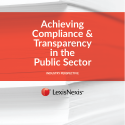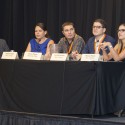Governments often mark the success of open data by how many datasets they’ve published on open portals. But publishing data, I’d argue, is open data 1.0. Open data 2.0 involves putting these data to good use. It means open data that informs policymaking budgetary decisions, that raises awareness of issues, and ultimately, that empowers communities.
Search Results for: transparency
Transparency and Trust are not the Same Thing
Has the availability of data and transparency of government information led to greater trust?
The Nitty Gritty of Government Compliance and Transparency
The Government today faces a slew of challenges, from trust issues to compliance and risk management. But what can help is a well-executed compliance system with public-sector records requests
The Solution for Better Compliance & Transparency
The public sector must rise to the challenge of providing public records in an efficient, transparent, effective and easy-to-access way
Achieving Compliance & Transparency in the Public Sector
LexisNexis’ public-sector solutions can change the way a government organization’s workflow runs.
How the Financial Transparency Act will Bring Open Data to Financial Regulation
The proposed Financial Transparency Act brings about a lot of questions. How exactly will it transform financial regulation? The video below explains how: Most financial regulatory agencies still use outdated document-based formats, instead of standardized, open data, to collect information from the financial industry. The Financial Transparency Act (H.R. 2477), introduced by Rep. Darrell Issa andRead… Read more »
Implementing Transparency in Financial and Performance Reporting
Learn more about how your government agency can meet financial transparency requirements and provide meaningful data through the latest technology.
Budget Transparency Isn’t Always Transparent…
Be honest, have you ever looked at your state budget? Probably not. And if you do, the complicated figures and numbers probably intimidated you. But there is hope. One of the co-authors of a recent report for the Volcker Alliance, titled Beyond the Basics: Best Practices in State Budget Transparency, Richard Greene, Special Projects AdvisorRead… Read more »
Data Transparency 2015
September 23rd, 2015 is a day to remember in DC for a number of reasons. The first – I’m sure you can guess – the Pope is in town! Yet, amid all the commotion is one phenomenon that has rapidly been changing the way we work, commute, relate, and function: open data. Today, the Data TransparencyRead… Read more »
Open Data is more than Transparency
Open data is not just a conversation about government accountability or transparency. The argument surpasses politics, as was underlined this summer at the Data Transparency Coalition’s DATA Act Summit when Ralph Nader and Grover Norquist appeared together to speak in support of making government information searchable and accessible. The conversation is really about how weRead… Read more »










